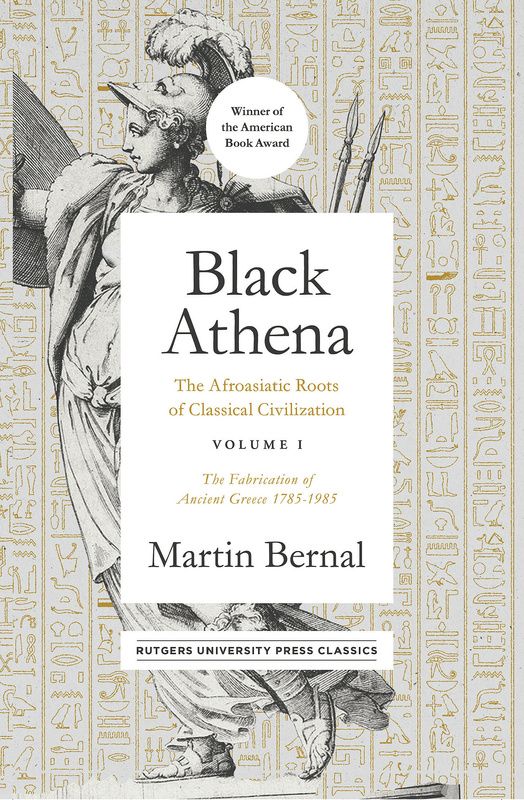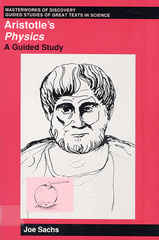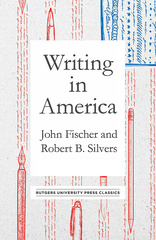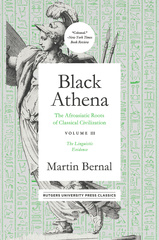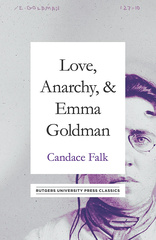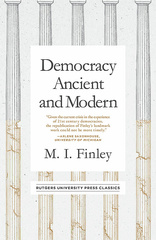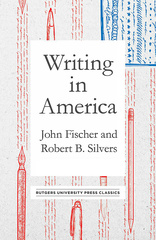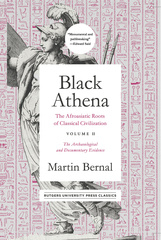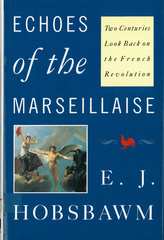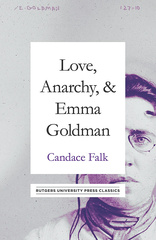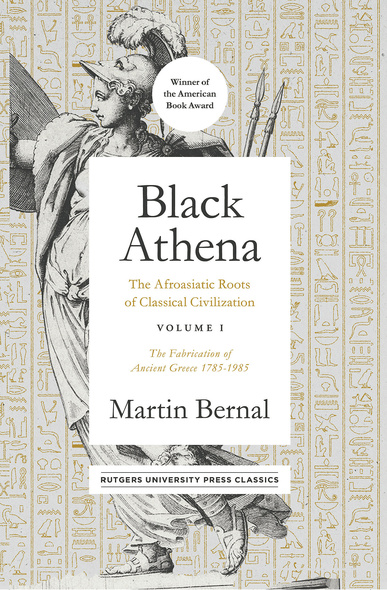
669 pages, 5 3/16 x 8
Paperback
Release Date:14 Feb 2020
ISBN:9781978804265
Hardcover
Release Date:14 Feb 2020
ISBN:9781978807129
Black Athena
The Afroasiatic Roots of Classical Civilization Volume I: The Fabrication of Ancient Greece 1785-1985
Rutgers University Press, Rutgers University Press Classics
Winner of the 1990 American Book Award
What is classical about Classical civilization? In one of the most audacious works of scholarship ever written, Martin Bernal challenges the foundation of our thinking about this question. Classical civilization, he argues, has deep roots in Afroasiatic cultures. But these Afroasiatic influences have been systematically ignored, denied or suppressed since the eighteenth century—chiefly for racist reasons.
The popular view is that Greek civilization was the result of the conquest of a sophisticated but weak native population by vigorous Indo-European speakers—Aryans—from the North. But the Classical Greeks, Bernal argues, knew nothing of this “Aryan model.” They did not see their institutions as original, but as derived from the East and from Egypt in particular.
In an unprecedented tour de force, Bernal links a wide range of areas and disciplines—drama, poetry, myth, theological controversy, esoteric religion, philosophy, biography, language, historical narrative, and the emergence of “modern scholarship.”
What is classical about Classical civilization? In one of the most audacious works of scholarship ever written, Martin Bernal challenges the foundation of our thinking about this question. Classical civilization, he argues, has deep roots in Afroasiatic cultures. But these Afroasiatic influences have been systematically ignored, denied or suppressed since the eighteenth century—chiefly for racist reasons.
The popular view is that Greek civilization was the result of the conquest of a sophisticated but weak native population by vigorous Indo-European speakers—Aryans—from the North. But the Classical Greeks, Bernal argues, knew nothing of this “Aryan model.” They did not see their institutions as original, but as derived from the East and from Egypt in particular.
In an unprecedented tour de force, Bernal links a wide range of areas and disciplines—drama, poetry, myth, theological controversy, esoteric religion, philosophy, biography, language, historical narrative, and the emergence of “modern scholarship.”
In a spectacular undertaking, Martin Bernal sets out to... restore the credibility of what he calls the Ancient Model of the beginnings of Greek civilizations... Bernal makes an exotic interloper in Classical studies. He comes to them with two outstanding gifts: a remarkable flair for the sociology - perhaps one should say politics - of knowledge, and a formidable linguistic proficiency... The story told by Bernal, with many fascinating twists and turns and quite a few entertaining digressions, is... a critical inquiry into a large part of the European imagination... a retrospect of ingenious and often sardonic erudition.
An astonishing work, breathtakingly bold in conception and passionately written... salutary, exciting, and, in its historiographical aspects, convincing.
A work which has much to offer the lay reader, and its multi-disciplinary sweep is refreshing: it is an important contribution to historiography and the sociology of knowledge, written with elegance, wit, and self-awareness... a thrilling journey... his account is as gripping a tale of scholarly detection and discovery as one could hope to find.
Bernal's material is fascinating, his mind is sharp, and his analyses convince.
A formidable work of intellectual history, one that demonstrates that the politics of knowledge is never far from national politics.
His book should be welcome to both classicists and ancient historians, most of whom will, now at least, be inclined to agree with him.
Bernal's work and the stir it has occasioned have caused ancient historians and archaeologists to undertake a major reexamination of methods and motives.
Colossal.... Bernal aims to revise current understanding of Ancient Middle Eastern history by taking seriously the ancient Greeks' legends that portrayed much in their civilization as originating in the Middle East, especially Egypt.
Demands to be taken seriously... Every page that Bernal writes is educating and enthralling. To agree with all his thesis may be a sign of naivety, but not to have spent time in his company is a sign of nothing at all.
A serious work that deals in a serious way with many of the principal issues of Aegean history in the second millennium B.C., and one can ask little more of any historical work.
[Bernal's] multifaceted assault on academic complacency is an important contribution to the development of a more open, historical, and culturally oriented post-processual archaeology.
A breathtaking panoply of archaeological artifacts, texts, and myths.
Bernal's enterprise - his attack on the Aryan model and his promotion of a new paradigm - will profoundly mark the next century's perception of the origins of Greek civilization and the role of Ancient Egypt.
Challenges the racism implicit in the recent 'cultural literacy' movement.
A monumental and path-breaking work.
[Martin Bernal] has forced scholars to reexamine the roots of Western civilization.
Martin Bernal has managed to make the subject of Ancient Greece both popular and controversial.
Martin Bernal’s Black Athena is nothing short of a monumental achievement in scholarship that re-oriented and transformed serious study of ancient civilizations. It remains a soaring accomplishment of classical erudition of the Afroasiatic foundation of Greek history.
Black Athena is a powerfully written and brilliantly researched book that relentlessly unveils the historical and cultural African origins of Western civilization. Still a must read for all those in search of truth.
Bernal has ample justification for calling into question many widely accepted hypotheses…. He shows that Egypt and its culture were misrepresented or simply ignored by European writers.
In a spectacular undertaking, Martin Bernal sets out to... restore the credibility of what he calls the Ancient Model of the beginnings of Greek civilizations... Bernal makes an exotic interloper in Classical studies. He comes to them with two outstanding gifts: a remarkable flair for the sociology - perhaps one should say politics - of knowledge, and a formidable linguistic proficiency... The story told by Bernal, with many fascinating twists and turns and quite a few entertaining digressions, is... a critical inquiry into a large part of the European imagination... a retrospect of ingenious and often sardonic erudition.
An astonishing work, breathtakingly bold in conception and passionately written... salutary, exciting, and, in its historiographical aspects, convincing.
A work which has much to offer the lay reader, and its multi-disciplinary sweep is refreshing: it is an important contribution to historiography and the sociology of knowledge, written with elegance, wit, and self-awareness... a thrilling journey... his account is as gripping a tale of scholarly detection and discovery as one could hope to find.
Bernal's material is fascinating, his mind is sharp, and his analyses convince.
A formidable work of intellectual history, one that demonstrates that the politics of knowledge is never far from national politics.
His book should be welcome to both classicists and ancient historians, most of whom will, now at least, be inclined to agree with him.
Bernal's work and the stir it has occasioned have caused ancient historians and archaeologists to undertake a major reexamination of methods and motives.
Colossal.... Bernal aims to revise current understanding of Ancient Middle Eastern history by taking seriously the ancient Greeks' legends that portrayed much in their civilization as originating in the Middle East, especially Egypt.
Demands to be taken seriously... Every page that Bernal writes is educating and enthralling. To agree with all his thesis may be a sign of naivety, but not to have spent time in his company is a sign of nothing at all.
A serious work that deals in a serious way with many of the principal issues of Aegean history in the second millennium B.C., and one can ask little more of any historical work.
[Bernal's] multifaceted assault on academic complacency is an important contribution to the development of a more open, historical, and culturally oriented post-processual archaeology.
A breathtaking panoply of archaeological artifacts, texts, and myths.
Bernal's enterprise - his attack on the Aryan model and his promotion of a new paradigm - will profoundly mark the next century's perception of the origins of Greek civilization and the role of Ancient Egypt.
Challenges the racism implicit in the recent 'cultural literacy' movement.
A monumental and path-breaking work.
[Martin Bernal] has forced scholars to reexamine the roots of Western civilization.
Martin Bernal has managed to make the subject of Ancient Greece both popular and controversial.
Martin Bernal’s Black Athena is nothing short of a monumental achievement in scholarship that re-oriented and transformed serious study of ancient civilizations. It remains a soaring accomplishment of classical erudition of the Afroasiatic foundation of Greek history.
Black Athena is a powerfully written and brilliantly researched book that relentlessly unveils the historical and cultural African origins of Western civilization. Still a must read for all those in search of truth.
Bernal has ample justification for calling into question many widely accepted hypotheses…. He shows that Egypt and its culture were misrepresented or simply ignored by European writers.
MARTIN BERNAL (1937-2013) was a British scholar of modern Chinese political history and a Professor of Government and Near Eastern Studies at Cornell University in Ithaca, New York. His celebrated Black Athena trilogy is a controversial series which argues that Ancient Greek civilization and language are Eastern and Egyptian in origin.
Preface and Acknowledgements
Transcription and Phonetics
Maps and Charts
Chronological Table
Introduction
Background
Proposed historical outline
Black Athena, Volume I: a summary of the argument
Greece European or Levantine? The Egyptian and West Semitic
Components of Greek Civilization / a summary of Volume 2
Solving the Riddle of the Sphinx and Other Studies in Egypto-Greek
Mythology / a summary of Volume
1 The Ancient Model in Antiquity
Pelasgians
Ionians
Colonization
The colonizations in Greek tragedy
Herodotos
Thucydides
Isokrates and Plato
Aristotle
Theories of colonization and later borrowing in the Hellenistic world
Plutarch’s attack on Herodotos
The triumph of Egyptian religion
Alexander son of Ammon
2 Egyptian wisdom and Greek transmission
From the Dark Ages to the Renaissance
The murder of Hypatia
The collapse of Egypto-Pagan religion
Christianity, stars and fish
The relics of Egyptian religion: Hermeticism, Neo-Platonism and Gnosticism
Hermeticism – Greek, Iranian, Chaldaean or Egyptian?
Hermeticism and Neo-Platonism under early Christianity, Judaism and Islam
Hermeticism in Byzantium and Christian Western Europe
Egypt in the Renaissance
Copernicus and Hermeticism
Hermeticism and Egypt in the 16th century
3 The triumph of Egypt in the 17th and 18th centuries
Hermeticism in the 17th century
Rosicrucianism: Ancient Egypt in Protestant countries
Ancient Egypt in the 18th century
The 18th century: China and the Physiocrats
The 18th century: England, Egypt and the Freemasons
France, Egypt and ‘progress’: the quarrel between Ancients and Moderns
Mythology as allegory for Egyptian science
The Expedition to Egypt
4 Hostilities to Egypt in the 18th century
Christian reaction
The ‘triangle’: Christianity and Greece against Egypt
The alliance between Greece and Christianity
‘Progress’ against Egypt
Europe as the ‘progressive’ continent
‘Progress’
Racism
Romanticism
Ossian and Homer
Romantic Hellenism
Winckelmann and Neo-Hellenism in Germany
Göttingen
5 Romantic linguistics
The rise of India and the fall of Egypt, 1740–1880
The birth of Indo-European
The love affair with Sanskrit
Schlegelian Romantic linguistics
The Oriental Renaissance
The fall of China
Racism in the early 19th century
What colour were the Ancient Egyptians?
The national renaissance of modern Egypt
Dupuis, Jomard and Champollion
Egyptian monotheism or Egyptian polytheism
Popular perceptions of Ancient Egypt in the 19th and 20th centuries
Elliot Smith and ‘diffusionism’
Jomard and the Mystery of the Pyramids
6 Hellenomania, 1
The fall of the Ancient Model, 1790–1830
Friedrich August Wolf and Wilhelm von Humboldt
Humboldt’s educational reforms
The Philhellenes
Dirty Greeks and the Dorians
Transitional figures, 1: Hegel and Marx
Transitional figures, 2: Heeren
Transitional figures, 3: Barthold Niebuhr
Petit-Radel and the first attack on the Ancient Model
Karl Otfried Müller and the overthrow of the Ancient Model
7 Hellenomania, 2
Transmission of the new scholarship to England and the rise of the Aryan Model, 1830–60
The German model and educational reform in England
George Grote
Aryans and Hellenes
8 The rise and fall of the Phoenicians, 1830–85
Phoenicians and anti-Semitism
What race were the Semites?
The linguistic and geographical inferiorities of the Semites
The Arnolds
Phoenicians and English, 1: the English view
Phoenicians and English, 2: the French view
Salammbô
Moloch
The Phoenicians in Greece: 1820–80
Gobineau’s image of Greece
Schliemann and the discovery of the ‘Mycenaeans’
Babylon
9 The final solution of the Phoenician problem, 1885–1945
The Greek Renaissance
Salomon Reinach
Julius Beloch
Victor Bérard
Akhenaton and the Egyptian Renaissance
Arthur Evans and the ‘Minoans’
The peak of anti-Semitism, 1920–39
20th-century Aryanism
Taming the alphabet: the final assault on the Phoenicians
10 The post-war situation
The return to the Broad Aryan Model, 1945–85
The post-war situation
Developments in Classics, 1945–65
The model of autochthonous origin
East Mediterranean contacts
Mythology
Language
Ugarit
Scholarship and the rise of Israel
Cyrus Gordon
Astour and Hellenosemitica
Astour’s successor? – J. C. Billigmeier
An attempt at compromise: Ruth Edwards
The return of the Iron Age Phoenicians
Naveh and the transmission of the alphabet
The return of the Egyptians?
The Revised Ancient Model
Conclusion
Appendix Were the Philistines Greek?
Notes
Glossary
Bibliography
Index
Transcription and Phonetics
Maps and Charts
Chronological Table
Introduction
Background
Proposed historical outline
Black Athena, Volume I: a summary of the argument
Greece European or Levantine? The Egyptian and West Semitic
Components of Greek Civilization / a summary of Volume 2
Solving the Riddle of the Sphinx and Other Studies in Egypto-Greek
Mythology / a summary of Volume
1 The Ancient Model in Antiquity
Pelasgians
Ionians
Colonization
The colonizations in Greek tragedy
Herodotos
Thucydides
Isokrates and Plato
Aristotle
Theories of colonization and later borrowing in the Hellenistic world
Plutarch’s attack on Herodotos
The triumph of Egyptian religion
Alexander son of Ammon
2 Egyptian wisdom and Greek transmission
From the Dark Ages to the Renaissance
The murder of Hypatia
The collapse of Egypto-Pagan religion
Christianity, stars and fish
The relics of Egyptian religion: Hermeticism, Neo-Platonism and Gnosticism
Hermeticism – Greek, Iranian, Chaldaean or Egyptian?
Hermeticism and Neo-Platonism under early Christianity, Judaism and Islam
Hermeticism in Byzantium and Christian Western Europe
Egypt in the Renaissance
Copernicus and Hermeticism
Hermeticism and Egypt in the 16th century
3 The triumph of Egypt in the 17th and 18th centuries
Hermeticism in the 17th century
Rosicrucianism: Ancient Egypt in Protestant countries
Ancient Egypt in the 18th century
The 18th century: China and the Physiocrats
The 18th century: England, Egypt and the Freemasons
France, Egypt and ‘progress’: the quarrel between Ancients and Moderns
Mythology as allegory for Egyptian science
The Expedition to Egypt
4 Hostilities to Egypt in the 18th century
Christian reaction
The ‘triangle’: Christianity and Greece against Egypt
The alliance between Greece and Christianity
‘Progress’ against Egypt
Europe as the ‘progressive’ continent
‘Progress’
Racism
Romanticism
Ossian and Homer
Romantic Hellenism
Winckelmann and Neo-Hellenism in Germany
Göttingen
5 Romantic linguistics
The rise of India and the fall of Egypt, 1740–1880
The birth of Indo-European
The love affair with Sanskrit
Schlegelian Romantic linguistics
The Oriental Renaissance
The fall of China
Racism in the early 19th century
What colour were the Ancient Egyptians?
The national renaissance of modern Egypt
Dupuis, Jomard and Champollion
Egyptian monotheism or Egyptian polytheism
Popular perceptions of Ancient Egypt in the 19th and 20th centuries
Elliot Smith and ‘diffusionism’
Jomard and the Mystery of the Pyramids
6 Hellenomania, 1
The fall of the Ancient Model, 1790–1830
Friedrich August Wolf and Wilhelm von Humboldt
Humboldt’s educational reforms
The Philhellenes
Dirty Greeks and the Dorians
Transitional figures, 1: Hegel and Marx
Transitional figures, 2: Heeren
Transitional figures, 3: Barthold Niebuhr
Petit-Radel and the first attack on the Ancient Model
Karl Otfried Müller and the overthrow of the Ancient Model
7 Hellenomania, 2
Transmission of the new scholarship to England and the rise of the Aryan Model, 1830–60
The German model and educational reform in England
George Grote
Aryans and Hellenes
8 The rise and fall of the Phoenicians, 1830–85
Phoenicians and anti-Semitism
What race were the Semites?
The linguistic and geographical inferiorities of the Semites
The Arnolds
Phoenicians and English, 1: the English view
Phoenicians and English, 2: the French view
Salammbô
Moloch
The Phoenicians in Greece: 1820–80
Gobineau’s image of Greece
Schliemann and the discovery of the ‘Mycenaeans’
Babylon
9 The final solution of the Phoenician problem, 1885–1945
The Greek Renaissance
Salomon Reinach
Julius Beloch
Victor Bérard
Akhenaton and the Egyptian Renaissance
Arthur Evans and the ‘Minoans’
The peak of anti-Semitism, 1920–39
20th-century Aryanism
Taming the alphabet: the final assault on the Phoenicians
10 The post-war situation
The return to the Broad Aryan Model, 1945–85
The post-war situation
Developments in Classics, 1945–65
The model of autochthonous origin
East Mediterranean contacts
Mythology
Language
Ugarit
Scholarship and the rise of Israel
Cyrus Gordon
Astour and Hellenosemitica
Astour’s successor? – J. C. Billigmeier
An attempt at compromise: Ruth Edwards
The return of the Iron Age Phoenicians
Naveh and the transmission of the alphabet
The return of the Egyptians?
The Revised Ancient Model
Conclusion
Appendix Were the Philistines Greek?
Notes
Glossary
Bibliography
Index

